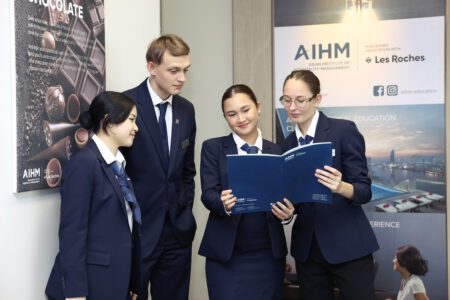In 2025, the hospitality industry is thriving with the return of travel and experiences. For hospitality management students, a diverse skill set in business operations, marketing, and human resources is crucial to leverage the industry’s comeback.
Practical training is key for those with ambitions to succeed. As multiple studies show, it’s those with real-world experience that cannot be learned in a classroom alone that are set to stand out in the job market. Whether it’s customer service, event planning, or risk management, such training builds the confidence needed to handle any situation — ensuring graduates are ready to excel in various hospitality roles.
An Asian Institute of Hospitality Management (AIHM) education achieves just that. Within its campus, students are immersed in and engaged in learning environments that mirror the industry’s dynamic nature. After all, this is a school founded by Minor Hotels, a company with over 560 hotels, resorts and residences in 58 countries, and associated with Les Roches, a QS five-star, New England Commission of Higher Education-accredited institution consistently ranked among the top four worldwide in hospitality education.
This unique combination offers AIHM students the best of many worlds: a Swiss-style education with an international perspective, paired with access to Minor Hotels’s global network and more than 35,000 professionals and entrepreneurs in the hospitality and tourism industry.

AIHM prepares students for global careers in hospitality through a curriculum blending industry practices and internships with leading companies. Source: Asian Institute of Hospitality Management
Bridging theory and practice, the AIHM way
Following the Les Roches experiential learning model, AIHM combines theoretical knowledge with learning by doing. Students train with seasoned hotel professionals, apply their skills in real-world settings, and gain valuable industry connections — all while staying close to home.
In hospitality management, the core philosophy is that to be a great manager, one needs practical mastery. Hence why from day one, AIHM students are hands-on — becoming proficient in everything from cooking and bed-making to customer service and concierge skills. The idea is simple: even as a general manager, understanding the daily challenges of your team helps you communicate effectively and find solutions.
Unique internship opportunities at over 560 Minor Hotels properties worldwide — spanning a diverse portfolio of eight hotel brands: Anantara, Avani, Elewana Collection, NH, NH Collection, nhow, Oaks, and Tivoli — provide AIHM students with valuable experience. Two internships are required: the first, a six-month practical internship in a field they’re passionate about, followed by a second, business/management-focused internship after a year of academic learning. Students can specialise in marketing, PR, HR, accounting, or operations.
“So, it’s all about hands-on experience and preparing students for their future careers,” says Chris Meylan, AIHM’s COO. “To ensure they are job-ready, we integrate many practical experiences throughout their studies. For example, we invite industry professionals to share insights on current trends and assign real-world hospitality projects to our students.”
After completing their practical semesters and internships, students transition to a more academic phase of the curriculum. While engaging activities like reports, presentations, and research are part of this stage, there is still a need for real management skill development. This is where the Integrated Hospitality Project (IHP) plays a crucial role — bridging the gap by immersing students in leadership and problem-solving experiences that prepare them for real-world challenges.
The IHP focuses on on-the-field management — teaching students how to break down problems, manage teams, communicate with clients, and deliver projects within timelines. Across three semesters, lecturers guide students as they work on case studies, before gradually taking on actual projects with hotels.
“At the end of the semester, students work independently on a challenging capstone project and present their deliverables to the client,” says Meylan. “Presenting to a real hotel general manager gives students a chance to impress and network, potentially helping them land a job.”

As part of Minor Hotels, AIHM offers students preferred employment status and global job opportunities upon graduation. Source: Asian Institute of Hospitality Management
Exclusive career opportunities
AIHM students have a unique advantage in securing global job opportunities after graduation. As part of Minor Hotels, Asia’s largest hospitality company, they enjoy preferred employment status, which means they get first dibs on job roles and traineeships. Minor Hotels prioritises AIHM students, offering them the chance to interview for positions before these roles are made available to the wider market.
“This approach allows us to effectively support our students while aligning with their career aspirations,” says Bree Creaser, Vice President of Learning and Development and Talent Management at Minor Hotels.
Minor Hotels is dedicated to understanding each student’s profile and tailoring opportunities based on their needs and ambitions. Whether students are interested in food and beverage, sales, marketing, or other areas, Minor Hotels works closely with AIHM to find the best match.
On AIHM’s end, they prepare students for these roles through a combination of academic excellence and leadership potential. The school’s intimate size allows for strong relationships with students, allowing Minor Hotels to tailor internships and job offers to their preferences. Workshops and lectures further help students align with the company’s values and explore various roles within the hotel industry.
As part of Minor Hotels’s Ascent Graduate Management Programme, graduates undergo an 18-month immersive experience. They rotate through six key hotel departments during the first phase, learning about various aspects of hotel operations. In the second phase, they dive deeper into two departments of their choice, gaining more specific knowledge and skills. Finally, the programme’s third phase focuses on specialisation, where graduates concentrate on one department, honing their expertise and preparing for a leadership role.
“It often helps graduates refine their career preferences,” says Creaser. “Many enter the programme with a clear idea of their path, but through these diverse experiences, they discover new interests and potential career opportunities they hadn’t considered before.”
Learn more about the Asian Institute of Hospitality Management.
Follow the Asian Institute of Hospitality Management on Facebook, Instagram, LinkedIn, and YouTube












